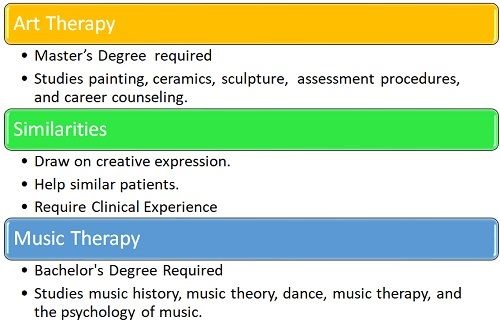When it comes to exploring options for mental health treatment and emotional healing outside of the realm of traditional talk therapy, art therapy and music therapy are among the most popular options. Although art therapists and music therapists both tend to have creative personalities and similar goals in treating clients through creative expression, the level of education needed for these respective roles is different, as is the coursework that makes up each program of study.
Similarities Between Art Therapy and Music Therapy
On the surface, the fields of art therapy and music therapy may seem more alike than different. They both draw on methods of creative expression, rather than traditional talk or psychotherapy, to serve clinical purposes of improving mental health. Art therapists and music therapists may work with some of the same populations, including children with learning and developmental disabilities, senior citizens with memory problems and patients struggling with mental health concerns, whether admitted to an inpatient psychiatric hospital or on an outpatient basis. For both career paths, clinical experience is required prior to practicing in the field.
Another similarity between art and music therapy is that the therapist uses expertise in the expressive art subject to guide the creative process of the client, who doesn’t need to have any background or skills in the art.
Educational Requirements
One of the biggest differences between art therapy and music therapy is the education required to prepare for work in each field. Even entry-level roles in the clinical practice of art therapy require a master’s degree, according to the United States Bureau of Labor Statistics. For music therapists, a bachelor’s degree meets the minimum education requirements to get started in the field. As a result, music therapists can begin their careers earlier than their peers studying art therapy.
This distinction in educational requirements can also affect a therapist’s scope of practice. Despite the emphasis on incorporating visual arts into their therapeutic interventions, art therapists often meet their state’s requirement to be licensed as a professional counselor or therapist and have more training in general counseling methods than music therapists. Some art therapists routinely offer both art therapy and regular counseling services, holding a combination job title such as Art Therapist/Licensed Professional Counselor. Since states typically require a master’s degree to attain a license as a professional counselor, music therapists with only a bachelor’s degree don’t have that opportunity.
Although only an undergraduate degree is required of music therapists, one-quarter of professionals in the field go beyond the bachelor’s degree. About 13 percent of music therapists hold a master’s degree and 11 percent, a post-baccalaureate certificate.
An Art Therapist’s Curriculum
Naturally, art therapists complete in-depth studies in the visual arts, while music therapists devote their studies to music theory and practice. In an art therapy program, students must enter with sufficient undergraduate studio coursework in art media such as painting, ceramics, sculpture, drawing and design. They complete graduate-level coursework in topics like assessment procedures, marriage and family counseling, substance abuse counseling, group counseling processes, psychopathology and career counseling. Coursework specific to art therapy practice includes art therapy theory, the art therapy process, creativity and symbolism and art therapy interventions in trauma treatment.
The program must include a minimum of 700 hours of supervised internship experience, according to the Art Therapy Credentials Board.
IMAGE SOURCE: Pixabay, public domain
An Undergraduate Curriculum in Music Therapy
Students in a music therapy degree program take courses in music history, music theory, dance, research in music and basic conducting. They develop their aural skills, or ear training, through a series of courses on the subject. Throughout their studies, they learn the use of different types of instruments, including pianos, guitars, drums and percussion instruments, as well as voice training.
Classes specific to the clinical practice include introduction to music therapy, music therapy foundations, the psychology of music and music therapy fieldwork. Approved bachelor’s degree programs in music theory must require a minimum of 1,200 hours of clinical training and internship experience, according to the American Music Therapy Association. On the clinical and mental health side of the discipline, coursework might include developmental psychology, human behavior, social work and social welfare, research and statistics and studies on the effects of substance abuse on family dynamics.
Although students of both art and music therapy must prove their technical skills in their respective arts for admission, art therapy majors do so through submitting a physical or digital copy of their portfolio, while music therapy students must perform an audition.
Additional Resources
What Does an Art Therapist Do?
What Does a Music Therapist Do?


